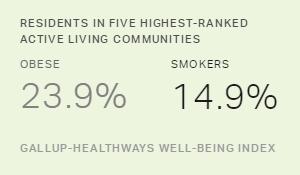GALLUP NEWS SERVICE
PRINCETON, NJ -- Americans are not blind to the difficulties faced by people who smoke; most say they are sympathetic toward smokers because they understand it is hard to quit even if someone wants to try. However, as the percentage of Americans willing to ban smoking in various public places continues to creep up, close to half of smokers now say they feel unjustly discriminated against by society.
Gallup first asked smokers how they felt about public smoking restrictions in 1994, and has been tracking this annually since 2001. The question asks: As a result of increased restrictions on smoking in public places, do you feel unjustly discriminated against as a smoker, or do you think the restrictions are justified?
In 2001, only one-third of smokers felt unjustly discriminated against. This year, according to a July 12-15, 2007, Gallup survey, the figure is 47%. Barely half of smokers, 51%, now say that public smoking restrictions are justified, down from two-thirds six years ago.
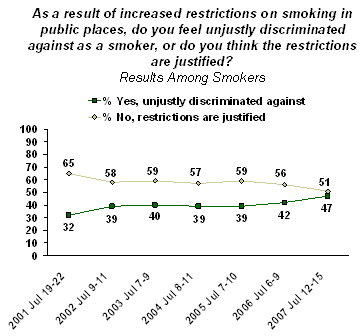
About one in five U.S. adults (21%) is classified as a smoker in Gallup's latest survey, according to a question that asks all adults whether they have smoked any cigarettes in the past week. (See "Latest Gallup Update Shows Cigarette Smoking Near Historical Lows" in Related Items.)
"Smoking Not Permitted"
The percentage of Americans saying smoking in all public places should be made "totally illegal" has not changed appreciably over the past six years, generally falling in the 39% to 40% range.
But, there has been an increase in public support for smoking bans in specific locales. Since 1987, Gallup has recorded fairly steady increases in the percentages of Americans favoring smoking bans in restaurants, hotels, and workplaces. In 2003, Gallup began asking about bars in the same context, and has since found increased support for a ban there as well.
Current attitudes are highly similar to what Gallup found in the previous measure from 2005. However, there is now more support for bans than there was two years prior to that. Since 2003, the percentage of Americans favoring smoking bans in each location has grown by six to nine percentage points.
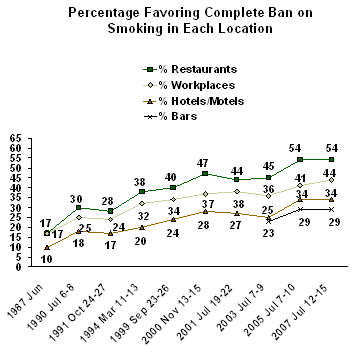
Those not favoring smoking bans aren't entirely tolerant of public smoking. Most Americans either say they favor a ban or designated smoking areas for smokers. Only in reference to bars does a substantial number of Americans (nearly one in four) think smoking should be allowed without restrictions.
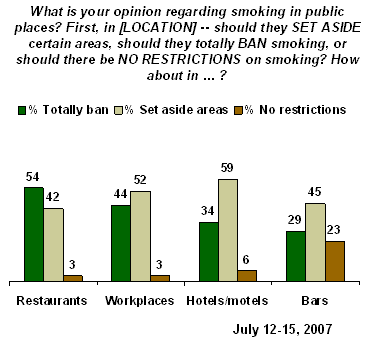
Secondhand Smoke Colors Attitudes
The percentage of smokers feeling unjustly discriminated against by smoking restrictions was actually higher in 1994 than in 2001 (39% vs. 32%), before climbing back to 39% in 2002. Given the small sample sizes of smokers in each survey, these changes are not significant. However, to the extent the pattern is a reflection of real changes in attitudes, it could be explained by the growth in public concern about secondhand smoke over the same period.
The U.S. Surgeon General's office first issued a report on the dangers of secondhand smoke in 1986. In 1987, Congress banned smoking on domestic flights of less than two hours. Within the next decade, a slew of state and local ordinances against smoking in public places came into being, as well as the federal restrictions banning smoking on all airlines. The dangers of "passive smoking" made national news in the mid-1990s surrounding a Florida-based lawsuit by flight attendants suing tobacco companies for health problems they say resulted from secondhand smoke on airplanes.
All of this may have contributed to the fairly rapid acceleration in public concern about the health risks of secondhand smoke recorded from 1994 to 1997. The percentage saying it is "very harmful" rose from 36% to 55% over this period. Since then, however, the percentage saying it is very harmful has been fairly stable, fluctuating between 51% and 56%.
Thus, smokers would have been less sensitive to the public health demand for restrictions on smoking in 1994 than they would have in 2001; and, they were more inclined to feel offended by smoking restrictions.
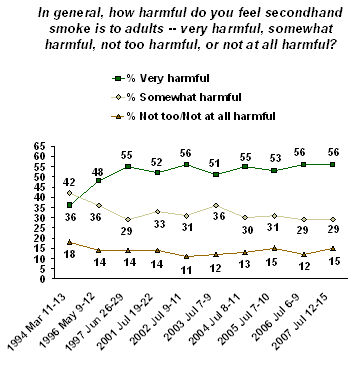
Bottom Line
The proportion of smokers who feel unjustly discriminated against because of restrictions on smoking in public places is significantly higher today than six years ago. Over the same period, Gallup has seen an increase in public demand for restrictions on smoking in certain public locales, especially workplaces where a majority of Americans now support a full ban. The backdrop to this is that a majority of Americans -- a consistent 51% to 56% -- believe breathing secondhand smoke can be very harmful to adults.
Survey Methods
Results are based on telephone interviews with 1,001 national adults, aged 18 and older, conducted July 12-15, 2007. For results based on the total sample of national adults, one can say with 95% confidence that the maximum margin of sampling error is ±3 percentage points.
For results based on the sample of 176 smokers, the maximum margin of sampling error is ±8 percentage points.
In addition to sampling error, question wording and practical difficulties in conducting surveys can introduce error or bias into the findings of public opinion polls.15. (Asked of smokers) As a result of increased restrictions on smoking in public places, do you feel unjustly discriminated against as a smoker, or do you think the restrictions are justified?
BASED ON 176 SMOKERS
|
|
Yes, unjustly
|
No,
|
No
|
|
% |
% |
% |
|
|
2007 Jul 12-15 |
47 |
51 |
2 |
|
|
|
|
|
|
2006 Jul 6-9 |
42 |
56 |
2 |
|
2005 Jul 7-10 |
39 |
59 |
2 |
|
2004 Jul 8-11 |
39 |
57 |
4 |
|
2003 Jul 7-9 |
40 |
59 |
1 |
|
2002 Jul 9-11 |
39 |
58 |
3 |
|
2001 Jul 19-22 |
32 |
65 |
3 |
|
1994 Mar 11-13 |
39 |
60 |
1 |
17. In general, how harmful do you feel second-hand smoke is to adults -- very harmful, somewhat harmful, not too harmful, or not at all harmful?
|
|
Very
|
Some-
|
Not too
|
Not at
|
Depends
|
No
|
|
% |
% |
% |
% |
% |
% |
|
|
2007 Jul 12-15 |
56 |
29 |
10 |
5 |
* |
* |
|
|
|
|
|
|
|
|
|
2006 Jul 6-9 |
56 |
29 |
8 |
4 |
* |
1 |
|
2005 Jul 7-10 |
53 |
31 |
12 |
3 |
* |
1 |
|
2004 Jul 8-11 |
55 |
30 |
9 |
4 |
1 |
1 |
|
2003 Jul 7-9 |
51 |
36 |
9 |
3 |
* |
1 |
|
2002 Jul 9-11 |
56 |
31 |
7 |
4 |
* |
2 |
|
2001 Jul 19-22 |
52 |
33 |
9 |
5 |
* |
1 |
|
|
|
|
|
|
|
|
|
1997 Jun 26-29 |
55 |
29 |
9 |
5 |
* |
2 |
|
1996 May 9-12 |
48 |
36 |
9 |
5 |
* |
2 |
|
1994 Mar 11-13 |
36 |
42 |
12 |
6 |
1 |
3 |
|
(vol.) = Volunteered response |
||||||
|
* = Less than 0.5% |
||||||
19. What is your opinion regarding smoking in public places? First, in [ITEMS A-C ROTATED, THEN ITEM D READ] -- should they SET ASIDE certain areas, should they totally BAN smoking, or should there be NO RESTRICTIONS on smoking? How about in … ?
A. Hotels & motels
|
Set aside
|
Totally
|
No
|
No
|
|
|
% |
% |
% |
% |
|
|
2007 Jul 12-15 |
59 |
34 |
6 |
1 |
|
2005 Jul 7-10 |
60 |
34 |
5 |
1 |
|
2003 Jul 7-9 |
68 |
25 |
6 |
1 |
|
2001 Jul 19-22 |
66 |
27 |
6 |
1 |
|
2000 Nov 13-15 |
65 |
28 |
7 |
* |
|
1999 Sep 23-26 |
70 |
24 |
6 |
* |
|
1994 Mar 11-13 |
68 |
20 |
10 |
2 |
|
1991 Oct 24-27 |
70 |
17 |
12 |
1 |
|
1990 Jul 6-8 |
73 |
18 |
8 |
1 |
|
1987 Jun |
67 |
10 |
20 |
3 |
|
* = Less than 0.5% |
||||
B. Workplaces
|
Set aside
|
Totally
|
No
|
No
|
|
|
% |
% |
% |
% |
|
|
2007 Jul 12-15 |
52 |
44 |
3 |
1 |
|
2005 Jul 7-10 |
56 |
41 |
2 |
1 |
|
2003 Jul 7-9 |
61 |
36 |
3 |
* |
|
2001 Jul 19-22 |
58 |
38 |
3 |
1 |
|
2000 Nov 13-15 |
57 |
37 |
6 |
* |
|
1999 Sep 23-26 |
61 |
34 |
4 |
1 |
|
1994 Mar 11-13 |
63 |
32 |
4 |
1 |
|
1991 Oct 24-27 |
67 |
24 |
8 |
1 |
|
1990 Jul 6-8 |
69 |
25 |
5 |
1 |
|
1987 Jun |
70 |
17 |
11 |
2 |
|
* = Less than 0.5% |
||||
C. Restaurants
|
Set aside
|
Totally
|
No
|
No
|
|
|
% |
% |
% |
% |
|
|
2007 Jul 12-15 |
42 |
54 |
3 |
1 |
|
2005 Jul 7-10 |
42 |
54 |
3 |
1 |
|
2003 Jul 7-9 |
52 |
45 |
3 |
* |
|
2001 Jul 19-22 |
52 |
44 |
4 |
* |
|
2000 Nov 13-15 |
48 |
47 |
5 |
* |
|
1999 Sep 23-26 |
56 |
40 |
4 |
* |
|
1994 Mar 11-13 |
57 |
38 |
4 |
1 |
|
1991 Oct 24-27 |
66 |
28 |
5 |
1 |
|
1990 Jul 6-8 |
66 |
30 |
4 |
-- |
|
1987 Jun |
74 |
17 |
8 |
1 |
|
* = Less than 0.5% |
||||
D. Bars
|
Set
|
Totally
|
No
|
No
|
|
|
% |
% |
% |
% |
|
|
2007 Jul 12-15 |
45 |
29 |
23 |
3 |
|
2005 Jul 7-10 |
40 |
29 |
28 |
3 |
|
2003 Jul 7-9 |
44 |
23 |
31 |
2 |
21. Should smoking in this country be made totally illegal, or not?
BASED ON 464 NATIONAL ADULTS IN FORM A
|
|
Yes,
|
No,
|
No
|
|
% |
% |
% |
|
|
2007 Jul 12-15 |
12 |
87 |
1 |
|
|
|
|
|
|
2005 Jul 7-10 |
16 |
83 |
1 |
|
2003 Jul 7-9 |
16 |
84 |
* |
|
2001 Jul 19-22 |
14 |
84 |
2 |
|
1994 Mar 11-13 |
11 |
86 |
3 |
|
1990 Nov Jul 6-8 |
14 |
84 |
2 |
|
* = Less than 0.5% |
|||
22. Should smoking in all public places be made totally illegal, or not?
BASED ON 537 NATIONAL ADULTS IN FORM B
|
|
Yes,
|
No,
|
No
|
|
% |
% |
% |
|
|
2007 Jul 12-15 |
40 |
59 |
1 |
|
|
|
|
|
|
2005 Jul 7-10 |
39 |
60 |
1 |
|
2003 Jul 7-9 |
31 |
68 |
1 |
|
2001 Jul 19-22 |
39 |
60 |
1 |
24. Which of the following statements better describes your view toward people who smoke -- [ROTATED: you are unsympathetic toward smokers because they continue to smoke even when they know it's harmful to their health and the health of those around them, or you are sympathetic toward smokers because they are addicted, and you understand that it is difficult to stop even if they want to]?
|
|
Un-
|
Sympathetic
|
Both/mixed
|
No
|
|
% |
% |
% |
% |
|
|
2007 Jul 12-15 |
37 |
58 |
4 |
2 |
|
|
|
|
|
|
|
2004 Jul 8-11 |
36 |
59 |
3 |
2 |
|
2001 Jul 19-22 ^ |
38 |
57 |
3 |
2 |
|
1997 Sep 25-28 |
36 |
53 |
7 |
4 |
|
1994 Mar 11-13 |
32 |
61 |
4 |
3 |
|
(vol.) = Volunteered response |
||||
|
^ = Asked of a half sample |
||||
